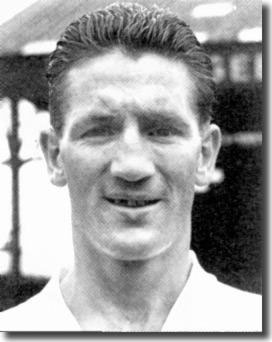 Part
2 - Dawning of a new era
Part
2 - Dawning of a new era
1961/62 was the first full season of Don
Revie's reign at Leeds United and the team came within a whisker of
an unprecedented drop into the Third Division, requiring a last day victory
at Newcastle to ensure a future in Division Two. For all the unsettling
jeopardy of their situation, however, and the pervasive financial difficulties,
there was a new found air of optimism about Elland Road that summer.
The battling performances of the spring, inspired by the terrier like
qualities of Scottish international Bobby
Collins and the reborn defensive fortitude of Jack
Charlton, coupled with boardroom support for Revie's ambition, offered
hope for the new season. In the midst of the relegation fight, £70,000
had been provided to fund the purchases of Collins, Billy McAdams, Cliff
Mason and Ian Lawson, increasing
the club's debt to around £150,000, underwritten by United's wealthy directors.
McAdams, had been a dismal failure, and left in the close season for
Brentford in a £8,000 deal, while players on the periphery of the side,
Alf Jones, John Kilford, Alan Humphreys, Terry Carling, Bobby Cameron
and Derek Mayers, also departed. The sales generated just £22,000, and
the debt remained a grave concern.
Nevertheless, such was the faith in Revie and his new side, that the
directors were ready to go a step further when they heard the rumours
from Italy that a former favourite was on the market. On Tuesday, 13 March,
the Yorkshire Evening Post carried the headline: 'Now what price
John Charles for United?'
It is unlikely that the Welsh superstar would have contemplated playing
in Division Three if Leeds had gone down, but the United hierarchy opened
discussions with Juventus regarding a possible transfer.
Charles had already set his mind on a return to the Football League and
was positive about United's overtures, seduced by the memory of his first,
glorious spell at Elland Road. The directors and manager were similarly
besotted and were resolved to raise the money, thought to be around £50,000,
to make their dream come true.
Originally, their strategy under Revie had been to build from the bottom
by attracting and nurturing the best of the country's teenage talent,
but the urgency of the relegation battle saw patience cast aside and the
cheque book flashed.
The team's shortcoming had been a distinct shortage of goals, and if
Charles could remedy that failing and inspire a promotion push, the directors
reasoned, it would be money well spent.
And so began a protracted courtship which dragged on for weeks, fraying
the nerves of all connected with the club. There was a series of emotional
peaks and troughs as negotiations fluctuated regularly with doubt as to
whether a deal would ever go through.
On 12 June, Charles welcomed United's interest: 'With my wife coming
from there and in view of the fact Leeds released me to come to Juventus,
I must give them every consideration.' Phil Brown reported on 3 July in
the Yorkshire Evening Post: 'A United negotiating party of four
will reach Turin on Thursday afternoon to have talks with the Juventus
board … arrangements were rushed through this morning for Mr Reynolds,
vice chairman Alderman Percy Woodward, and team manager Mr Don Revie to
fly to Turin early on Thursday morning. Another director, Mr Albert Morris,
is on holiday at Monte Carlo and will join them in Turin. Talks will begin
immediately.'
Manchester United, still rebuilding after Munich, were reputed to have
readied a £75,000 bid in 1959, but now Leeds' main rivals for the signature
were Cardiff City, who had sought to acquire Wales' favourite son during
his first spell at Elland Road. However, Charles' professed preference
for returning to his spiritual home kept United in the driving seat.
The issue was not so much where Charles would end up as whether he would
be allowed to move at all. The sticking point was Juventus' need for a
replacement. The Brazilian World Cup player Amarildo, for whom they were
ready to fork out £185,000, was their target. The Turin club were reluctant
to sign any deal which could not be voided if they were unsuccessful in
their chase - Leeds were understandably just as fixed on a deal without
strings. The clubs kept talking 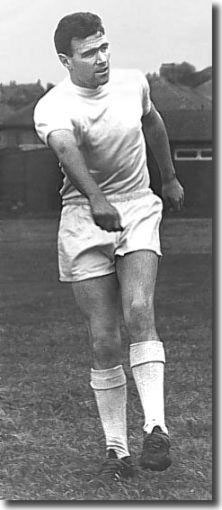 and
in the end, even though there were complications in the Amarildo negotiations
and the Juventus president Umberto Agnelli resigned part way through talks,
the deal eventually went through on Thursday, 2 August. The fee was £53,000,
increasing Leeds' debts to more than £200,000.
and
in the end, even though there were complications in the Amarildo negotiations
and the Juventus president Umberto Agnelli resigned part way through talks,
the deal eventually went through on Thursday, 2 August. The fee was £53,000,
increasing Leeds' debts to more than £200,000.
back to top
During the negotiations, Don Revie briefed Charles on his ambitions for
the club, and how central he was to his plans. It was the manager's gifts
of persuasion which sealed the Welshman's commitment.
Revie had a knack for getting his man, and used the fame of Charles to
convince another player that his future lay at Elland Road. Free scoring
Airdrie inside-forward Jim Storrie
had turned down initial advances the previous season, but when Revie came
calling a second time, the Scottish part timer was convinced. He said:
'One of the reasons I went to Leeds was because they had signed John Charles.
I had no particular desire to go to Leeds because they were in the Second
Division but Revie told me they had got Bobby Collins and John Charles
and all of a sudden the package looked pretty impressive.'
The £15,650 fee and the Charles settlement took Revie's spending on players
to a shade under £135,000 in less than six months, a phenomenal sum in
those days.
But it was not the largesse of the directors which was being relied upon.
The purchase of Charles was a key component of a new strategy.
The directors estimated that the club needed to generate around £83,000
a year from gate receipts to break even financially. In 1961-62 average
home crowds had been less than 13,500, which, with a ticket price of 3s,
would have generated around £40,000. The attraction of the returning hero,
it was reckoned, would boost crowds to at least 20,000, which at the same
admission price would generate receipts of £63,000. A bold decision was
taken to increase entrance fees by 150% to 7s 6d, upping likely takings
to over £150,000. It made Leeds United the most expensive Football League
side to support outside London.
The Yorkshire Evening Post noted that 'United's first thoughts
on the increased prices hovered for a long time on the basis of charging
£1 to go in,' but such notions were swiftly dismissed. As it was, rebellion
was still very much in the air when the more conservative prices were
announced.
The Yorkshire Evening Post carried the news of the club's intentions
in its 9 July edition, more than three weeks before the Charles deal was
completed: 'Leeds United today asked reserved seat ticket holders to pay
3s a home match more next season for the privilege of watching John Charles
playing again in United's colours. The Board, which has shouldered the
burden of the earlier transfers is giving the public a chance to show
the firmness of the promises to support the club if the directors embarked
on a policy of team-building and bringing personalities to Elland Road.
'Season ticket holders, who had already been warned that prices were
subject to increase if Charles was signed, are being asked to pay 10 guineas
for West Stand seats and 8 guineas for the Lowfields Road Stand.
'The stand ticket increases, said Mr Reynolds, were the first in six
years. He said: "I have a feeling that the public response to this
appeal will be an overwhelming vote of confidence in the new policy that
is being adopted at Elland Road and the spirit, enthusiasm and effort
that must be apparent to all."
'Mr Reynolds went on: "All must agree the Board has done a great
job in providing finance to make the progress that has been made since
the new policy was formulated. Now it is the turn of our supporters and
well-wishers."'
However, United fans were distinctly unimpressed by the news and were
vitriolic in their response, with the Yorkshire Evening Post printing
many of their letters.
Mr T Young, Cookridge: 'Whilst the directors are to be commended on their
achievements and ambitions, they are unrealistic in expecting a return
of capital outlay in too short a time. I feel sure that old and new supporters
would not have minded paying an extra guinea, or even 30s, but three guineas
will put season tickets beyond the reach of many, and will antagonise
not a few.'
Mr D Siddle wrote on behalf of 49 employees of a local printing firm:
'We supporters have finally been let down by this outrageous exploitation
of the loyal followers. In the last two to three years, the Leeds public
have had to put up with a struggling team and second class entertainment.
Now, after all the promises, we have to pay these absurd prices. Until
there is revision we shall not attend any first-team game.'
'Ten Angry Supporters' from another printing firm wrote: 'We would like
to thank Mr Reynolds and his directors for bringing Charles back. What
a pity we can't afford to watch him.'
'Disgusted', North Park Avenue, Roundhay: 'For 40 years I have been a
faithful supporter at every home game and many away. During last season,
I suffered, but United did not reduce their prices. They have made a profit
of £12,000 on Charles by selling him for £65,000 and having him back for
£53,000 but at the expense of the supporters meantime. After 40 years
I shall find myself watching the old blue and white stripes of years ago
- but this time Huddersfield Town's.'
Club chairman Harry Reynolds was enraged by the reaction, retorting:
'We have pinned our faith in the public by giving them what they have
clamoured for and all we ask is their support. When the return of Charles
was 99 per cent sure, we appealed to our supporters to help us financially,
and we started with an appeal to the season ticket holders to help us
by paying 3s a match extra for 21 matches. We are pleased to say the response
has been excellent. We feel that it is now the turn of supporters who
use the turnstiles to do their share. It has been decided that the first
two home League matches should be all-ticket and that we would appeal
to our supporters to help us by paying the following charges. 5s for the
Boys' Enclosure, 7s 6d for the 3s enclosure, 10s for the 3s 6d enclosure
and 12s 6d for the paddock. Any seats that have not been taken up will
be 20s for Lowfields Road Stand and 25s for the West Stand.
back to top
'We have had many criticisms on the poor standard of play and negative
results that have been the spectators' lot for many years, but let us
forget the past, look to the success of the future that we are starting
to achieve and help the board and all connected with United to achieve
honours.'
The controversy rumbled on for weeks, even temporarily superceding the
news about how the Charles negotiations were proceeding. There was considerably
less dispute about Don Revie's on field tactics than there had been about
the 'Reynolds Plan'.
Leeds' only weakness in the closing months of the previous season - they
had conceded just four times in the final nine matches - had been their
lack of goals. With the arrival of Storrie and Charles, Revie reasoned
that their chances would be much improved.
Despite some recent innovations in tactical arrangements - Brazil won
the World Cup with a revolutionary 4-2-4 set up, Alf Ramsey's humble Ipswich
Town scooped the 1962 league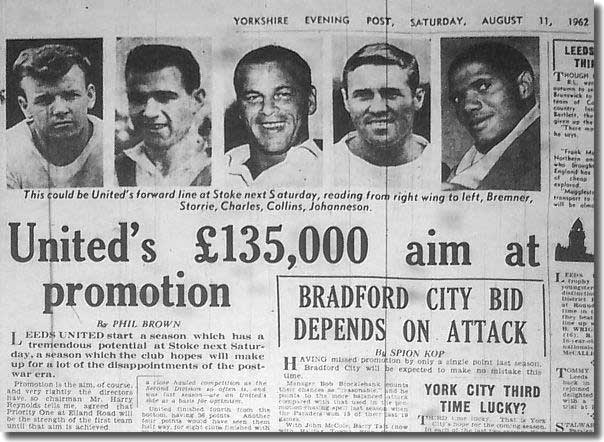 title by abandoning wingers, while Revie himself was the fulcrum of the
deep lying centre-forward style which had won Manchester City the FA Cup
in 1956, aping the original revolution by Hungary - most teams still operated
minor variations on the basic 'WM' formation.
title by abandoning wingers, while Revie himself was the fulcrum of the
deep lying centre-forward style which had won Manchester City the FA Cup
in 1956, aping the original revolution by Hungary - most teams still operated
minor variations on the basic 'WM' formation.
This involved a big centre-half leading the defence, flanked by full-backs
and protected by wing-halves. Up front, a powerful centre-forward would
be served by wingers, while skilful inside-forwards played down the channels,
controlling play from their withdrawn positions.
Don Revie's favoured approach stuck to this main theme, but threw in
a few individual flourishes. Scottish keeper Tommy Younger played behind
Jack Charlton and the veteran full-backs, Grenville Hair and Cliff Mason.
Skipper and half-back Freddie Goodwin's natural inclination was to defend,
so he normally withdrew to shore up the centre with Charlton, leaving
combative Scottish wing-half Eric Smith to range in front of them.
Further forward, Revie sought aerial dominance via Charles, with fleet-footed
South African Albert Johanneson a constant outlet on the left flank.
Billy Bremner, a notional right winger, was in reality an energetic midfielder
who took the opportunity to get up and down the right wing. Inside-left
Bobby Collins was the general of the side, and played deeper, balancing
Smith's holding role. Revie deployed Storrie as a second-centre forward,
although expecting him to drop back when required, particularly in away
matches.
The game plan was simple - play a pressurising game, denying the opposition
space and time, and get the ball forward quickly to Charles. He would
secure possession and bring the other forwards into the play, making openings
for them to run onto. It sounded effective, but there were flaws.
Firstly, many of the team were into their thirties and ill equipped for
the hard running game which Revie's plans demanded.
Secondly, Charles had never been an orthodox target man. In his first
spell at Elland Road, he had often played off another forward, and was
much more effective coming on to the ball than playing with his back to
goal. Italian football had demanded a subtle and cerebral approach, where
guile was needed to avoid the cynical defensive tricks, rather than brute
force. Charles retained the physical presence to hold his own against
big defenders, but preferred playing to scrapping.
Furthermore, his love of Italian food and lack of pre-season training
had eroded his fitness. When he returned to Elland Road, Charles weighed
in at 15 and a half stone - he was still an impressive physical specimen,
but his edge had been blunted, and he proved a difficult challenge for
trainer Les Cocker, who drove his troops hard, demanding that they should
be among the fittest in the country.
Cocker pulled his hair out at the antics of his new charge. Mario Risoli,
in his autobiography of the player: 'Cocker's job was 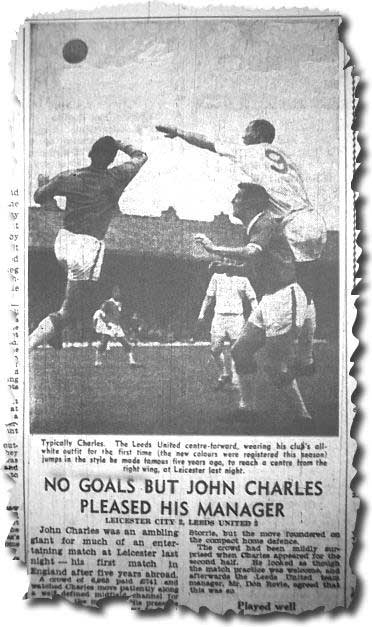 made
harder by the fact Charles had grown accustomed to the more sedate Italian
methods of training. "John drove Les and Syd spare in training,"
reveals Storrie. "The training at Leeds was very hard. It was a lot
of stamina work and running and the big fella was having trouble with
that. John would amble along and Les couldn't handle that. He would scream
and shout at John and John would look at him as if he was daft. A lot
of the young players like myself accepted it because we were young and
enthusiastic but John was in the autumn of his career and he didn't want
to go through all that crap."
made
harder by the fact Charles had grown accustomed to the more sedate Italian
methods of training. "John drove Les and Syd spare in training,"
reveals Storrie. "The training at Leeds was very hard. It was a lot
of stamina work and running and the big fella was having trouble with
that. John would amble along and Les couldn't handle that. He would scream
and shout at John and John would look at him as if he was daft. A lot
of the young players like myself accepted it because we were young and
enthusiastic but John was in the autumn of his career and he didn't want
to go through all that crap."
'Willie Bell remembers one occasion
at training when Charles left Cocker lost for words. "Les would select
different players and take them outside to do a warm-up. On this day he
picked John. They went outside and John just stood there, put his two
arms out in front of him and started flopping his wrists while the other
players were stretching and working. 'What are you playing at?' said Les.
And John just said, 'Three championship medals.' Les had no answer to
that."
back to top
''We were a very physical, hard-working and hard-running side,"
explains Jim Storrie. "It was high-pressure football. We had to put
the opposition's players under pressure all over the park. We harassed
and chased. Revie was one of the first managers to introduce that way
of playing. I was a forward and my first job was to defend. That was the
mentality. John was like a duck out of water playing that way. Had he
been younger he might have adapted. He wanted to play one-touch football
and flick the ball here and there. At the time that wasn't Leeds' style.
Long balls were played to the corner flag and John was expected to chase
after them. At half-time in one game I remember John saying, 'I'm not
running my pants off for long balls.' And wee Billy Bremner said, 'You're
making that f***ing obvious!'"'
With the benefit of hindsight, it is clear that Leeds had taken a huge
gamble by throwing Charles into their mix, an overweight 30-year-old with
dodgy knees and a love for pasta, but the mythology of Charles as he had
once been blinded even cynics to the facts.
Even in a pre-season friendly the signs were there. Charles made his
first appearance on Monday 13 August away to Leicester City, and the report
in the Yorkshire Post was scarcely flattering: 'John Charles was
an ambling giant for much of an entertaining match at Leicester. A crowd
of 6,965 paid £741 and watched Charles move patiently along a well-defined
midfield channel for most of the match. His presence was undoubtedly a
comfort to Leeds but his part in the game was rarely more positive than
that of linker. His first genuine attempt to score came in the 65th minute
when he failed to twist a header round sufficiently. Then came a startling
40-yard sprint and a glorious flick to Storrie, but the move foundered
on the compact home defence.'
The burly Leicester defenders gave their illustrious opponent a rough
ride. He came out of the game needing a stitch in a head wound, and he
felt the pace: 'I'm stiff nearly all over, I am not yet fit, not match
fit. But it won't take long.'
Despite reservations about the time it would take Charles to readjust
to the physical English game, the local papers were very positive about
Leeds United's chances for the new season, amazingly so, given their mediocre
performances over the previous twelve months.
Phil Brown: 'I must say it feels strange to be talking about promotion
when it is only a few weeks ago I was talking of relegation fears. Not
many clubs finish the last Saturday of one season sweating on relegation
and start the next hoping for promotion as United are doing. But it is
not as daft as it looks. The side finished the season with far better
results and sometimes far better football than that with which it began
and played so much in 1961/62.
'United finished fourth from the bottom, having 36 points. Another four
points would have seen them half way. Another 10 points - and they threw
away just about as many as that - would have seen them fifth.
'For all their poor final position there was little wrong with the defence.
They had 61 goals scored against them, and there were only seven clubs
with fewer. But the attack was the worst in the division with the exception
of the bottom club, Brighton. United had but 50 goals. Charles and Storrie
should alter that, I am as certain as can be.'
It would be a while before the reaction to the price increases could
be tested, for the opening day fixture was away to Stoke City. It represented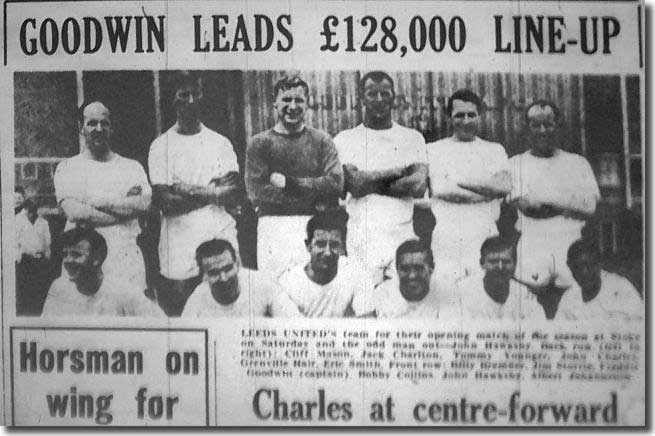 a stern challenge against fancied promotion candidates, who could boast
their own international superstar in 47-year-old outside right Stanley
Matthews, reunited with his home town club after a lengthy spell at Blackpool.
The Potters had other talented individuals and it would be a difficult
test for Don Revie's new XI, lining up exactly as the manager wanted,
with Storrie playing an orthodox inside-forward's role.
a stern challenge against fancied promotion candidates, who could boast
their own international superstar in 47-year-old outside right Stanley
Matthews, reunited with his home town club after a lengthy spell at Blackpool.
The Potters had other talented individuals and it would be a difficult
test for Don Revie's new XI, lining up exactly as the manager wanted,
with Storrie playing an orthodox inside-forward's role.
In the end, the sense of occasion got to both sides, and there was little
football of any real quality. Phil Brown confirmed as much in his match
report: 'United's longest-serving player, Grenville Hair, said to me as
we walked into the ground together: "Phil, I have never had butterflies
worse than this." For all his long service with United, and his three
heavy tours all over the world, Hair was feeling the high drama of the
match. And behind John Charles' cheerful laughing there were signs of
nerves, too. The "big feller" knew this was an occasion revolving
around him and his team like nothing before in the history of the club.'
back to top
Neither Charles nor Matthews could impose themselves on the game, although
the Welshman did manage to show some decent touches. Phil Brown: 'Charles
overwhelmed Stuart in a header after a cross by Storrie. Charles was varying
his positional game between deep and forward. From a deep position he
nearly had Collins through with a long flick header … but the Welshman
is not yet jumping as high as he used to.'
Stoke had the better of the game, but Storrie, Collins and Johanneson
played well, and Leeds managed to come away with the points after Storrie
scored the only goal five minutes before half-time. Stoke had a throw
in near their own corner flag, but wing half Eric Skeels miskicked it
into Storrie's path inside the area. The Scot was perfectly placed and
took his time to drive home from 10 yards with keeper O'Neill well beaten.
The lure of the returning Charles clearly had the desired effect, for
a crowd of 27,118 flocked into the Victoria Ground. However, the promised
rejection by Elland Road home supporters of the new prices was evident
four days later, as United entertained Rotherham United - just 14,119
fans were in the crowd, less than a thousand more than the previous season's
average. Chairman Harry Reynolds was apoplectic with rage - 'It is very
disheartening, in fact, I almost feel like saying to the Board that if
we cannot get support, and the public do not want football in Leeds, what
is the use of trying?'
He branded those who had complained so vigorously at the price increases
'nigglers', going on, 'What would they have to say if we could not meet
our obligations - we still have payments to make on players we signed
last season - and that to pay them we were going to have to go back to
the old policy of selling our players? There would be an outcry. Why should
we spend time and give money away. We are not obliged to foot the bill
any more than the supporters are. They have clamoured for this thing.
They wanted it.'
Those who stayed away from the Rotherham match, the 'summat for nowters'
(as Reynolds' contemptuously termed them), missed some rare excitement
for the match was a thriller. Don Revie kept faith with the team that
had played at Stoke, although he pushed Storrie forward to support Charles.
Leeds were left light in midfield as a consequence, and fell a goal behind
after just three minutes. McIlmoyle broke clear on the right and sent
the ball across the area. Grenville Hair and Tommy Younger were not on
each other's wavelength at all and allowed Alan Kirkman to tap home.
Rotherham, cheaply assembled and eager to impress, worked hard and got
the better of the game where it mattered most. The nippy Don
Weston on the right wing was far too quick for Cliff Mason, while
Freddie Goodwin and Eric Smith, who ended the game limping with a knee
injury, were simply overrun. Bobby Collins and Albert Johanneson had decent
games, but Billy Bremner had an off day.
After 36 minutes Weston outstripped a loose and leaden footed defence
to get on the end of left winger Ian Butler's free kick to put Rotherham
two up, and the same man made it 3-0 five minutes after the interval.
A Leeds defender appeared to handle Butler's shot on the line but as the
ball came out Weston scored spectacularly with an overhead kick.
The crowd were silenced by what they were seeing, but Leeds came back
into things a minute later with Storrie heading in from Bremner's free
kick. After that, United seemed to finally realise they were in a match,
according to the Yorkshire Post's Eric Stanger: 'Raid after raid,
hammering after hammering fell on the stout Rotherham defence but Ironside,
Jackson, Morgan and Madden were magnificent even if their tackling was
sometimes more vigorous than discreet.'
For all Leeds' attacking frenzy, it was the 75th minute before the Rotherham
defence was pierced again. Bremner was brought down in the area by centre-half
Peter Madden and the referee had little hesitation in pointing to the
spot. John Charles had been the penalty taker during his first period
at Elland Road, and the crowd expected him to take it, but it was Albert
Johanneson who stepped forward, converting the spot kick with ease.
Five minutes later, the United fightback seemed to be complete, as Charles
got in the spirit, recalling the glories of his earlier days at Elland
Road by blasting home a splendid equaliser. The Welshman had already seen
a 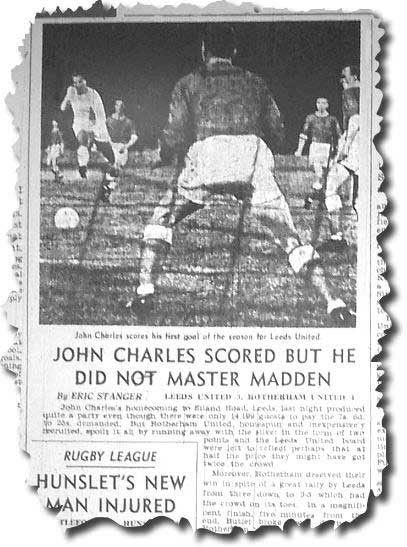 shot
on the burst kicked off the line, before playing a one-two with Storrie
on the edge of the Rotherham area and driving the ball home without breaking
stride to beat keeper Roy Ironside.
shot
on the burst kicked off the line, before playing a one-two with Storrie
on the edge of the Rotherham area and driving the ball home without breaking
stride to beat keeper Roy Ironside.
The crowd rose as one to acclaim the sort of goal with which Charles
had earned his fame. At that point the heartaches of the summer and the
controversy of the ticket prices seemed to be irrelevant. King John had
shaken off the cobwebs and returned from the dead.
Unfortunately, the gallant Rotherham side had sufficient resolve to come
back for a last gasp winner. With five minutes to go, Butler sprinted
down the left wing and centred perfectly for Kirkman to finish things
off with his second goal. It was 4-3 and the Elland Road faithful were
devastated.
They went away crowing, however, at Charles' magic moment, although in
truth his contribution was mediocre. Eric Stanger: 'By his own standards
Charles had a modest match until late in the game when he was set aflame
by the spark of the Leeds rally. To that point he had been outjumped and
often outfought on the ground by Madden. Perhaps too much is expected
of him. He was not last night the Charles of old; no doubt he will be
with a few pounds off as the result of some hard training.'
back to top
United and Charles were still getting to know each other, as Phil Brown
commented: 'He has not yet fully adjusted to the side, nor the side to
him. There were too many high centres altogether last night, for instance.'
Stanger echoed the comment: 'There is one lesson his colleagues must
learn and that is to play with him as well as to him. Often he was a move
ahead of them especially in the first half.'
It had been a disjointed and disappointing performance, with the formerly
tight rearguard exposed as hesitant, flatfooted and slack, while the attack
looked one dimensional and over eager for much of the time.
The following Saturday brought the real test of the policy of high prices,
with the visit to Elland Road of a promising Sunderland side. Willie Bell
was recalled in place of the injured Eric Smith, but otherwise the side
was unchanged. All the talk before the match was of the contest between
Charles and the away side's celebrated centre half, Charlie Hurley, acclaimed
by many as the best defender in the country.
Despite an early morning apology from Harry Reynolds to the fans following
his previous outbursts against them, the crowd was only marginally up
on the Rotherham game - 17,753. It was much better than many of the home
crowds enjoyed the previous season - less than 8,000 witnessed December's
goalless home draw with Leyton Orient, while 4,517 had been present to
watch John McCole's four goals defeat Brentford in the League Cup - but
after the big money signing of Charles, a useful away win and a thrilling
home match, it was too disappointing for words as far as the board were
concerned. In fact, it could have been worse, for, according to Phil Brown,
'at 2.30, with only half an hour to go, there were hardly 4,000 inside'.
It was evident that the Leeds public felt strongly about
the scheme, for Sunderland were one of the big guns of the division, managed
by Alan Brown, and featuring the goalscoring talents of the remarkable
Brian Clough, the promise in goal of young Jim Montgomery and the hard
working Anderson at right-half.
Sunderland had the better of the opening exchanges, but were thrown into
disarray after 26 minutes when inside left McPheat was taken off on a
stretcher with a broken leg after a clash with Bobby Collins. The Sunderland
manager was furious, claiming that the damage was intentional.
Leeds should have been ahead by then, despite some scares, as Albert
Johanneson had fluffed a penalty. Anderson appeared to take Bremner down
at the edge of the box to bring a fortunate penalty award. Again Charles
was passed over for the penalty because he had lost confidence after missing
six spot kicks in a row during his last season in Italy. Johanneson was
again preferred, but his shot was weak and Montgomery was able to pounce
on it.
Despite his miss, Johanneson continued to trouble Sunderland, combining
well with the aggressive Collins on the left, although it was the North
East side who continued to have the better of the game, with Hurley dominating
Charles for the most part. The 10 men of Sunderland worked much harder
than United and it was little surprise when the match reached the break
without a goal.
In the second half, the greater numbers eventually told and Leeds were
able to generate some momentum, scoring the only goal of the game after
57 minutes. Billy Bremner cleverly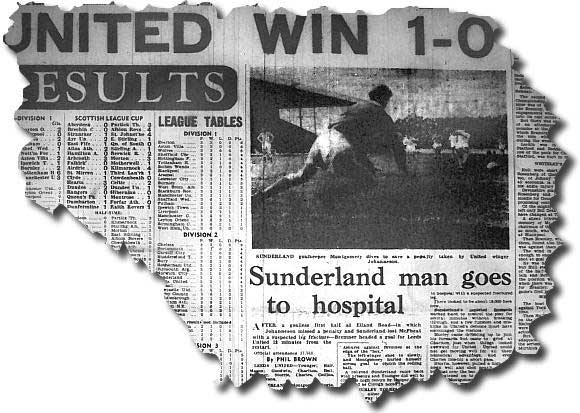 steered home Johanneson's centre from 10 yards with his head.
steered home Johanneson's centre from 10 yards with his head.
The game signalled the end of the experiment with ticket prices, Harry
Reynolds finally admitting that the move had been a mistake: 'I have been
wrong, as wrong as could be, I can see that now. We have to have a lot
of money by September, and I was sure that the public of all ranks would
come in behind us when we had made that tremendous effort to get them
Charles back. I was misled by my own experiences of people saying to me
how they would give us every support for Charles. Very clearly I did not
judge the average reaction, and I must take full blame for the whole business.
'I want to make it clear that my co-directors opposed the increases in
the form we made them. They said they were too steep. I told them I was
absolutely positive that they were not - that people would willingly pay
them. So they agreed to my way. You know the rest. Then I got mad. I am
a plain-speaking man, and I said a few things out of the heat of my disappointed
enthusiasm that I should not have said. I am very sorry if I have given
offence.'
Before the impact of the change of heart could be assessed, Leeds United
had two away games to face during the next week, against Rotherham and
Huddersfield. For the Rotherham trip, Ian Lawson and John Hawksby came
in for Goodwin and Johanneson. The half-back was dropped, but while he
was out he sustained an injury which kept him out of the side until the
beginning of November. Grenville Hair took over as captain from Goodwin.
John Charles scored his second goal of the season in a 2-1 defeat, a match
chiefly remembered for a clash in the Leeds dressing room at half time.
back to top
Jack Charlton: 'There'd been a corner against us in the first half, and
their centre forward had sent in a floating header from the edge of the
eighteen-yard box. Tommy [Younger] should have collected it easily, but
as the ball hit the ground he dived over it and it bounced into the net.
When Don [Revie] came into the dressing room at half-time he was not best
pleased. He pointed at me and said that I should have picked up the centre-forward
on the edge of the eighteen-yard box. "Wait a minute," I said,
"the bloody ball was headed from about twenty-five yards away. I'm
not bloody responsible. If a guy gets in and heads a ball within ten yards,
that's my responsibility. If I'd have gone out there and somebody else
had headed the ball where I should have been positioned, then you would
have bollocked me!"
'I had a teacup in my hand and I threw it against the wall. It missed
Don by about a foot and smashed to pieces. Everyone else went quiet while
I went ranting on. Then Don just walked out of the dressing room.'
Jim Storrie: 'I remember John [Charles] looking around with a "What
have I come back to?" expression on his face. There was shouting
and bawling. It was pandemonium.'
Charles scored his third goal in a 1-1 draw at Huddersfield, although
he was again disappointing with Town defender John Coddington eclipsing
him. According to the Yorkshire Post's Richard Ulyatt: 'Coddington
seldom was slipped by Charles and often outjumped his famous rival,' although
Phil Brown argued '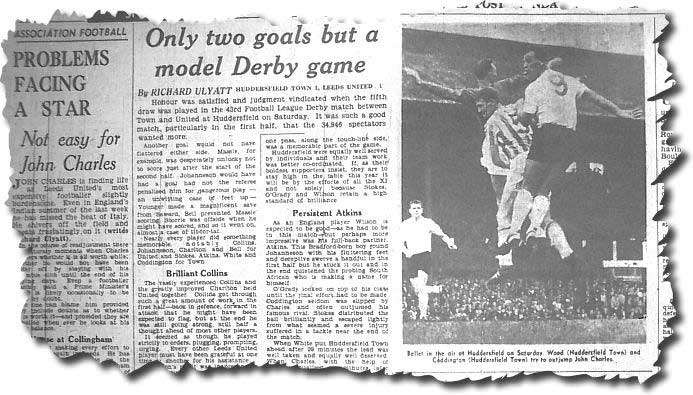 Charles
had been 100 per cent improved right from the start.'
Charles
had been 100 per cent improved right from the start.'
Whatever, Charles had one goal disallowed and equalised for Leeds in
the 34th minute, driving home from 16 yards after a battle in the area.
Ulyatt reserved his main praise for the previous season's heroes, Bobby
Collins and Jack Charlton: 'The vastly experienced Collins and the greatly
improved Charlton held United together. Collins got through such a great
amount of work in the first half - back in defence, forward in attack,
that he might have been expected to flag, but at the end he was still
going strong, still half a thought ahead of most other players. It seemed
as though he played strictly to orders, plugging, prompting, urging. Every
other Leeds United player must have been grateful at one time or another
for his assistance. Charlton's merit was in preventing Stokes scoring
and rescuing his team when White or Massie seemed on the point of scoring.
Some of his clearances were inelegant, but at least one pass, along the
touchline side, was a memorable part of the game.'
After five games, United were sitting in a disappointing eleventh position,
and questions were being asked about when the star would start to shine.
Richard Ulyatt had been a stout supporter of John Charles ever since his
debut as a youngster and gave the following insight in Monday's Yorkshire
Post following the Huddersfield match:
'John Charles is finding life as Leeds United's most expensive footballer
slightly burdensome. Even in England's Indian summer of the last week
he has missed the heat of Italy. He shivers off the field and sweats frustratingly
on it.
'Charles realises as well as those of us who have watched him play in
five matches for Leeds United that he has a long way to go before he becomes
the man who can lead his team to promotion. Charles has not been the footballing
giant he was five years ago when leaving Leeds for Turin.
'At the same time, he has scored three goals, which is a reasonable average
and which suggests that once he is match fit he will do nearly as much
as has been expected of him. On the day in July Charles signed, Mr Revie
said it would be mid October before he was fully fit and supporters were
warned not to demand too much before then.'
The same day, Phil Brown ran a less supportive story in the Evening
Post, noting the rumours that had started circulating:
'The crop of national newspaper stories about John Charles being already
unsettled and wanting to go back to Italy will be the subject of a special
report by team manager Don Revie to United's directors this afternoon.
Mr Revie tells me: "I have already interviewed Charles, for I was
greatly upset by the stories and I have had his firm and ready assurance
that he does not want to leave United."
'Charles said he thought the reports this weekend stemmed from what he
described as exaggerated remarks he had made as friend to friend, rather
than as a newspaper interview with a reporter on a Sunday newspaper. Coming
from a highly paid man who is currently short of form and fitness, Charles'
widely reported comments yesterday may well have left a bad impression
with many supporters, even after his explanation.'
Charles had told the Sunday Express' Alan Hoby: 'I haven't told
anyone this before but never in my life have I been so worried. Normally
I never worry. But night after night I've lain awake unable to sleep trying
to work out what is wrong, why I should feel like this, why my confidence
seems to have gone, why my form has been so disappointing.' It was a mark
of Charles' habitual naïveté that he was surprised when the confidence
was broken.
back to top
Despite all the gossip, the directors could at least comfort themselves
with the knowledge that reducing their ticket prices paid off handsomely
in the midweek match at home to Bury - the crowd swelled to a healthy
28,313, the biggest seen at Elland Road since September 1959, when they
were still in the First Division.
Matters went less well onfield, however, and after 20 minutes Charles
strained his back in a heavy fall, and was rendered an ineffective passenger
on the left wing, hobbling his way through the remainder of the game.
Even before the mishap, however, Leeds were second best, although Billy
Bremner opened the scoring in the 26th minute, after being slid in by
Bobby Collins. Leeds could not retain their lead, and ended up on the
wrong end of a 2-1 defeat, which could easily have been far heavier. The
home side had simply not been at the races, although once again one player
had shone out.
Eric Stanger: 'Collins time after time shrewdly created order out of
disorder in midfield … Collins apart - he was the best forward on the
field - Leeds could scarcely raise a gallop. Bury swarmed around the Leeds
goal and it was as much good luck as good management which kept them from
a third score.'
The crowd were hugely disillusioned, as was the manager, and Don Revie
knew as his side dropped into the bottom half of the table that it was
simply not good enough - things had to be done.
And things were done … things which were to impact on the Elland Road
club in a way that could never have been imagined.
Part 2 - Dawning of a new era












 and
in the end, even though there were complications in the Amarildo negotiations
and the Juventus president Umberto Agnelli resigned part way through talks,
the deal eventually went through on Thursday, 2 August. The fee was £53,000,
increasing Leeds' debts to more than £200,000.
and
in the end, even though there were complications in the Amarildo negotiations
and the Juventus president Umberto Agnelli resigned part way through talks,
the deal eventually went through on Thursday, 2 August. The fee was £53,000,
increasing Leeds' debts to more than £200,000. title by abandoning wingers, while Revie himself was the fulcrum of the
deep lying centre-forward style which had won Manchester City the FA Cup
in 1956, aping the original revolution by Hungary - most teams still operated
minor variations on the basic 'WM' formation.
title by abandoning wingers, while Revie himself was the fulcrum of the
deep lying centre-forward style which had won Manchester City the FA Cup
in 1956, aping the original revolution by Hungary - most teams still operated
minor variations on the basic 'WM' formation. made
harder by the fact Charles had grown accustomed to the more sedate Italian
methods of training. "John drove Les and Syd spare in training,"
reveals Storrie. "The training at Leeds was very hard. It was a lot
of stamina work and running and the big fella was having trouble with
that. John would amble along and Les couldn't handle that. He would scream
and shout at John and John would look at him as if he was daft. A lot
of the young players like myself accepted it because we were young and
enthusiastic but John was in the autumn of his career and he didn't want
to go through all that crap."
made
harder by the fact Charles had grown accustomed to the more sedate Italian
methods of training. "John drove Les and Syd spare in training,"
reveals Storrie. "The training at Leeds was very hard. It was a lot
of stamina work and running and the big fella was having trouble with
that. John would amble along and Les couldn't handle that. He would scream
and shout at John and John would look at him as if he was daft. A lot
of the young players like myself accepted it because we were young and
enthusiastic but John was in the autumn of his career and he didn't want
to go through all that crap." a stern challenge against fancied promotion candidates, who could boast
their own international superstar in 47-year-old outside right Stanley
Matthews, reunited with his home town club after a lengthy spell at Blackpool.
The Potters had other talented individuals and it would be a difficult
test for Don Revie's new XI, lining up exactly as the manager wanted,
with Storrie playing an orthodox inside-forward's role.
a stern challenge against fancied promotion candidates, who could boast
their own international superstar in 47-year-old outside right Stanley
Matthews, reunited with his home town club after a lengthy spell at Blackpool.
The Potters had other talented individuals and it would be a difficult
test for Don Revie's new XI, lining up exactly as the manager wanted,
with Storrie playing an orthodox inside-forward's role. shot
on the burst kicked off the line, before playing a one-two with Storrie
on the edge of the Rotherham area and driving the ball home without breaking
stride to beat keeper Roy Ironside.
shot
on the burst kicked off the line, before playing a one-two with Storrie
on the edge of the Rotherham area and driving the ball home without breaking
stride to beat keeper Roy Ironside. steered home Johanneson's centre from 10 yards with his head.
steered home Johanneson's centre from 10 yards with his head. Charles
had been 100 per cent improved right from the start.'
Charles
had been 100 per cent improved right from the start.'